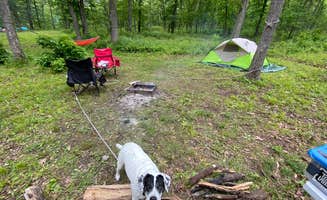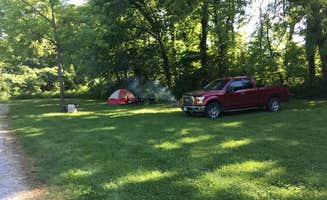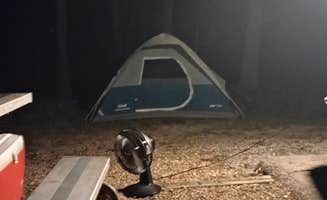The tent camping areas around Eldon, Missouri offer primitive outdoor experiences with limited amenities in a wooded landscape. Most conservation areas provide vault toilets and designated camping spots while requiring campers to pack in drinking water. The gravel roads accessing these sites can become challenging during wet periods, with several locations requiring navigation of creek crossings that may flood after heavy rainfall.
What to do
Fishing opportunities: Paydown Access provides direct river access for anglers. "Camped here in early March. Beautiful, very secluded, and we were the only ones there," reports one visitor at Paydown Access.
River activities: Multiple conservation areas provide stream access for wading, fishing or launching watercraft. At Pikes Camp, visitors appreciate the "great little river access" with "a shaded grassy area for camping."
Wildlife observation: The conservation areas harbor diverse wildlife. Amanda from Fiery Fork Conservation Area notes: "We were able to see some wildlife while staying there as well. Armadillos, deer, and a few different bird types could be found easily."
Hammock camping: Several locations feature suitable trees for hammock setup. Whitney L. mentions Fiery Fork has "good hammock trees" among its amenities, along with "flat-level surface" for traditional tent setup.
What campers like
Solitude during off-peak times: Weekdays and non-summer months offer quieter camping experiences. Nick G. states: "I stayed here for a few days in April. There were a few campers, but I'd be very surprised if this place isn't loud and packed in the summer."
Budget-friendly options: The conservation areas provide no-cost camping opportunities. Shannon M. appreciates that Fiery Fork is "a nice place if you're on a budget and just need a get away."
Shade coverage: Most tent sites around Eldon feature tree coverage. At Scrivner Road Conservation Area, Josh S. found "an abundance of wildlife equestrian trails and hiking" in this "Swiss Army knife of rugged off the path camping."
Creek exploration: Beyond the rivers, smaller waterways provide recreation opportunities. Multiple reviewers mention creek beds for playing and exploring during summer months when water levels are appropriate.
What you should know
Road conditions: Several access roads require careful navigation, especially in wet conditions. Chrischelle N. advises: "I recommend smaller RVs due to the 2 miles of gravel and high water areas you go through to get there."
Trash management: Pack-out policies are in effect as most sites lack trash collection. At Osage-Tavern Access, Casey notes there's "1 bathroom and place for trash" but most locations require carrying out your own waste.
Limited cell coverage: Network connectivity is minimal or nonexistent at most sites. Erick H. warns campers to "be prepared to have no cell signal...had to drive a couple of miles for a signal. That is with Spectrum I believe they use Verizon."
Seasonal flooding: Water crossings can become impassable after heavy rain. Jenny D. cautions: "If the waters too high, there's a bridge into the site that could be flooded so watch the weather."
Tips for camping with families
River beaches: Some water access points feature sandy areas ideal for children. Amanda found Fiery Fork "would be a nice place to bring our kids since there is quite a bit of 'beach' at the river access for them to play and see nature."
Site selection: For families, sites away from boat launches tend to be quieter. At McCubbins Point, the "public boat ramp" area can become busy and potentially less suitable for young children.
Pest protection: Tick prevention is essential during warmer months. Erick H. warns about "ticks galore" at conservation areas, suggesting appropriate clothing and repellent for children.
Distance from facilities: Plan accordingly for limited amenities. Most sites feature only vault toilets, requiring families to bring all necessary supplies including drinking water.
Tips from RVers
Size restrictions: Large RVs are not recommended on the gravel access roads. Chrischelle N. specifically advises "smaller RVs due to the 2 miles of gravel and high water areas" at Fiery Fork Conservation Area.
Generator considerations: While some campers use generators at conservation areas, the proximity of sites can create noise issues. Josh S. observed at Pikes Camp that visitors should "be prepared for some neighbors and young visitors through the night."
Leveling challenges: Prepare for varied terrain at primitive sites. Most tent camping areas near Eldon lack formal RV pads, with several reviewers mentioning the need for leveling equipment.




